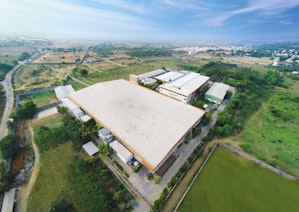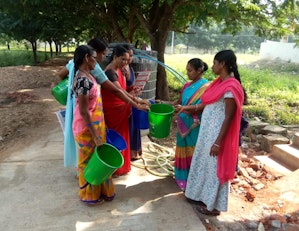Despite its dynamic economic development, poverty and other socio-economic problems are still presenting India with significant challenges. In most Indian cities a considerable part of the population lives in slums or similarly precarious circumstances and basic municipal services such as functioning waste systems are inadequate. Over the last decade, the number of cities with more than 5000 residents has grown by about 50% to almost 8000 by now. This is where 31 percent of the total population lives. As this trend continues, half of India's population will live in cities by 2030. The outsourcing of polluting businesses from large metropolises places an additional burden on small towns. The construction of infrastructure and communal basic services has not been able to keep up with these developments or is taking place in an unplanned and inefficient manner. As a result, residents are exposed to health risks and significant environmental hazards.
Recycling of secondary raw materials is still far too rare in India. Insufficient waste management has mainly been due to a lack of awareness as well as inefficient collection, processing and recycling operations. Most of these processes take place informally and are associated with high environmental and health risks. To date, there are barely any adequate policies or funding programmes in place.
For more than eleven years, Hörmann has maintained a production location in the community of Gagillapur near Hyderabad with around 300 employees. There is a growing demand for employees with higher qualifications due to the modernisation being carried out at Shakti Hörmann in Gagillapur (new machines, restructured production processes). The local quality of life is unattractive to many people as a result. In particular, there is a lack of long-term local solutions in social infrastructure and services. Therefore, qualified professionals in particular are looking for more attractive locations. In these conditions, it is very difficult for Hörmann to retain good employees on a permanent basis or to recruit qualified employees and appropriate management personnel for the further modernisation and expansion of the production location. This further highlights the need to increase the competitiveness of the location. The municipal leadership and administration in Gagillapur needed support to develop the district – for example in the preparation of complex planning documents such as a land use plan and in the introduction of a municipal waste management system.
To improve the local conditions in Galligapur permanently, Hörmann and the German Corporation for International Cooperation (GIZ) joined forces in a development partnership. The cooperation is part of the develoPP programme of the German Federal Ministry for Economic Cooperation and Development (BMZ) and will be implemented from August 2018 to April 2022 with technical support from the GIZ. Its objective is to develop prerequisites for the systematic improvement of key local factors in cooperation with the municipality, local NGOs and local businesses. In addition to a pilot solution for a sustainable waste management system in one district, the main objective was to enable the municipality to develop a municipal land use plan and a concept for municipal waste management. These now form the basis for securing state and private investment for further development of the location. The project works alongside numerous initiatives of the Indian government, such as Smart Cities, Clean India and Skill India, aimed at tackling the country’s economic, environmental and social challenges. The objective is to meet local needs and support sustainable development with tailor-made and jointly developed solutions.
The project focused primarily on a relevant infrastructure and capacity building in communal and local civil society structures. The cooperation project is conceptually divided into six areas: Development of ownership of the issue by the partners involved; Development and presentation of a land use plan; Participatory development of a local waste management project and its presentation to relevant government institutions; Development and implementation of a public, local pilot project for waste collection and recycling; Knowledge management and communication of the results for projects at regional and national level.
The Hörmann Group was jointly responsible for the coordination of all local activities, especially the development of a pilot project for the disposal of solid waste. Alongside the development of a land use plan, GIZ is the main agency responsible for knowledge transfer in the field of urban and industrial planning, particularly in waste management, during the course of the project. The local businesses, the entire population and the town of Dundigal as a whole benefit from the development partnership for Gagillapur. The Hörmann Group and GIZ actively involve the community and local civil society in important decisions and developments as part of the project.
In April 2022, the “Sustainable waste management” project was handed over successfully to the city, including regular waste collection services and a concept for waste separation. Additionally, a DRCC (Dry Resource Collection Centre) was established by cleaning up an area that had been used as an unofficial waste disposal site for a long time. A hall was then built on the grounds that offers areas for separating dry waste. The project has successfully laid the foundation for sustainable waste management.
“Indian practicality and German precision came together to benefit the people of Gagillapur in this special project.“
- Mrinalini Shastry, Project manager and coordinator


